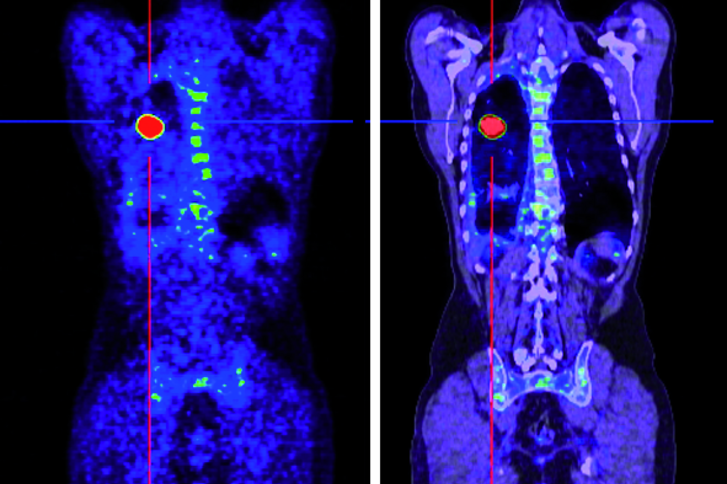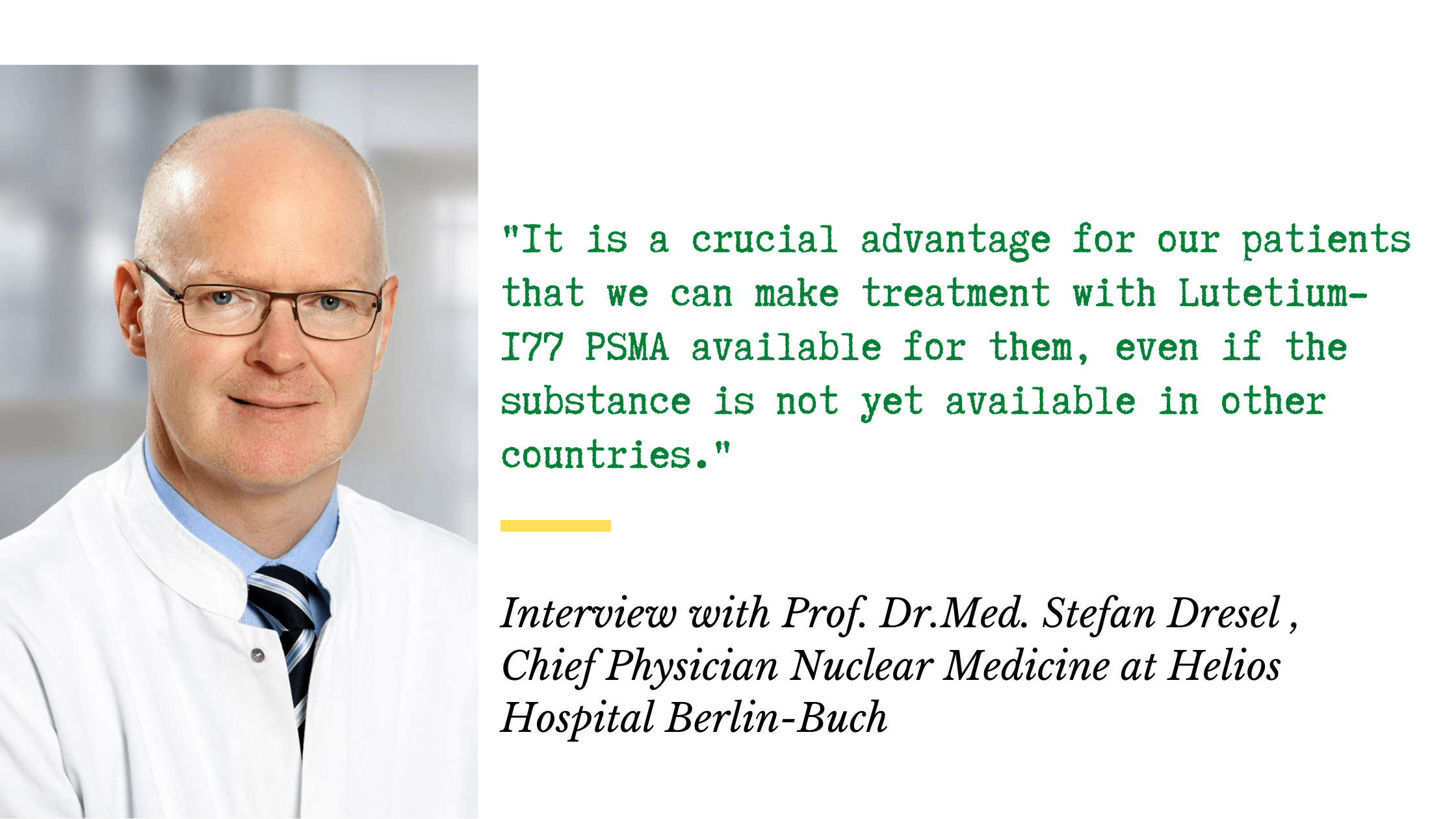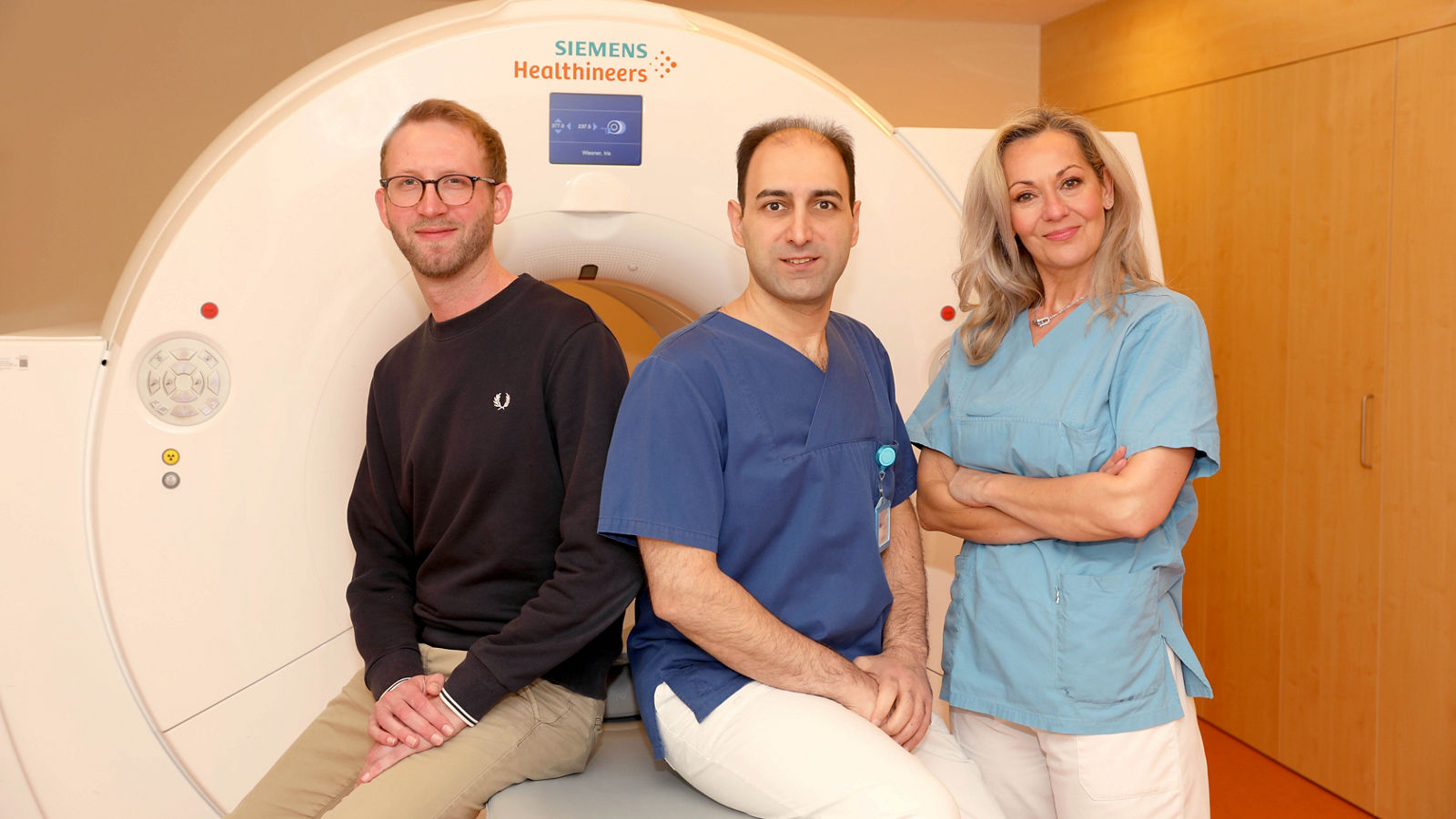
Helios Berlin-Buch: Treatment of advanced-stage neuroendocrine tumor
About MIBG therapy
MIBG radionuclide therapy (MIBG or Meta-iodo-benzyl-guanidine) is a radioactive method used to treat neuroendocrine tumors.
Meta-iodo-benzyl-guanidine is a substance that is chemically similar to adrenaline and norepinephrine and therefore behaves in a similar way in the body. This substance is absorbed by the nervous tissue and, therefore, by various neuroendocrine tumors.
During the therapy, MIBG is combined with a radioactive substance (iodine-131), so that the radioactive substance is specifically absorbed into the tumor within a few minutes. The radioactivity then remains in the tumor for several days (half-life of iodine-131: 8.0 days) and thus can irradiate the tumor cells from the inside and thereby destroy them. Since the range of radiation is only a few millimeters, the surrounding healthy tissue is ppredominantly protected.
What types of tumors can be treated by MIBG therapy?
MIBG therapy can be used to treat neuroendocrine tumors of the neuronal type, such as neuroblastoma, pheochromocytoma, and paraganglioma.
In addition, therapy can be carried out for other malignant diseases that are associated with an increased accumulation of MIBG (for example, medullary thyroid carcinoma).
What to expect from MIBG therapy?
MIBG therapy is a palliative therapy aimed at shrinking tumor tissue and to slow down the tumor growth.
A cure should not be expected from MIBG therapy, but further progression of the disease may be delayed in up to 50% of cases.
What kind of patients is MIBG therapy suitable for?
The possibility of MIBG therapy should be discussed together with the attending physician.
This method is especially suitable for patients with highly differentiated, slowly growing tumors / metastases, which are less accessible for chemotherapy and for whom surgical or local procedures (radiofrequency ablation / chemoembolization) are no longer suitable.
In principle, MIBG therapy is also possible for children with metastatic neuroblastoma.
In such case, therapy is also carried out at the hospital, but the indications and preparation for therapy are carried out exclusively in conjunction with the department of the clinic for pediatric and adolescent medicine.
Whether therapy is a treatment option is being investigated in a study in which MIBG is combined not with iodine-131, but with iodine-123. It is chemically absolutely identical, but it has much less energy and therefore leaves a much lower dose of radiation in the body. With this method, the specialists can see how the MIBG behaves, that is, whether it is sufficiently absorbed by the tumor cells.
How does MIBG therapy work?
If MIBG therapy is appropriate for the patient as a treatment option, a 3 to 6 day inpatient stay should be planned for the therapy.
Therapy process:
MIBG therapy is administered to the patient through a constant venous cannula as an infusion over 2 hours with constant blood pressure and ECG monitoring, since crises of high blood pressure may occur during therapy. Possible crises of high blood pressure will be treated with medication. Due to radiation, an inpatient stay in our therapy unit is required until the patient can be discharged. On the day of discharge, a full body scintigraphy is performed to record the distribution of the radioactive material. Regular blood tests are self-explanatory.
Pain relievers and medications for nausea / vomiting are administered if needed.
Possible side effects of therapy
Comparing to conventional chemotherapy protocols, MIBG therapy is generally well tolerated without significant side effects.
To prevent possible liver edema in the case of extensive liver metastases, fortecortin is administered on the day of therapy (intravenously, then orally).
Because this medication can cause stomach problems, a stomach protector (usually Pantosol) is also prescribed while the patient is taking Fortecortin.
In the case of hormonally active tumors, the increased secretion of hormones during therapy can lead to an acute crisis of high blood pressure, which, however, can be relieved with medication.
In rare cases, patients complain of nausea, headache, or increased fatigue.
Usually, changes in the blood count are also monitored, namely red blood cells, platelets and leukocytes. Usually no additional treatment is necessary, but as a precaution, doctors monitor these changes closely.
In patients with extensive liver metastases, radiation exposure to liver tissue can sometimes lead to painful liver swelling or liver dysfunction.
What the patient should know about Post-Therapy Routine
Follow-up after MIBG therapy should be carried out by the attending oncologist or family doctor. It is recommended to check blood tests and, if necessary, liver parameters. The result of treatment should be checked after about 3 months using SPECT / CT and laboratory tests (tumor markers). Usually, the MIBG therapy can be repeated, depending on the tolerance and the achieved effect.
What should a patient take into account when staying in a hospital on MIBG therapy?
During a hospital stay on MIBG therapy, the patient is not allowed to leave the room or receive visitors due to Radiation Protection Ordinance.
If a child is undergoing therapy, the family members are provided with a separate room. During their stay in the hospital, relatives will be informed about the necessary radiation protection measures so that they can personally look after the child.
Read more:
Do you need more information about Helios Hospitals or want to schedule your treatment?





